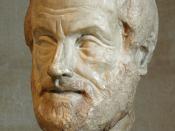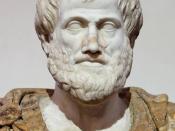Authority is common throughout history and the present. Even though it is rejected or disregarded, authority is often used to justify knowledge. At one time over 2000 years ago, the words of a Greek Philosopher named Aristotle were often referred to as an authority. His words were alone considered to be the greatest authority in science. He based his generalizations on qualitative observations and logical reasoning. His views were then backed by the Christian Church so Aristotle remained the authority of many things until the 1600s. His authority was declined when a man named Galileo used mathematics and quantitative observations to test Aristotle's generalizations.
Qualitative observations, the method in which Aristotle used are the use of logical reasoning and concerned with the qualities of an object. For example, his analysis of a heavier object's acceleration being greater than that of a lighter one is a qualitative observation. Along with his logical reasoning, his generalizations were considered the authority for the time.
In Galileo's time, the use of mathematical calculations and quantitative analysis were used to challenge the generalizations made by Aristotle. He used mathematical methods of measuring by devising and constructing clocks and inclined planes to use for quantitative measurements. His use of math to calculate acceleration and speed proved that Aristotle's generalization of a heavier object dropping faster that a lighter one is incorrect, and that the acceleration for all objects are the same regardless of its mass or composition.
Generalizations that Aristotle made were due to his logical reasoning and qualitative analysis. He stated that: 1) An object falls at a constant speed, 2) An object will fall faster if it's is heavier, and 3) It will fall slower if it meets resistance. His points are strong and quite advance for his time, he explains...


